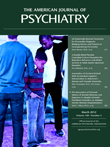A Double-Blind Placebo-Controlled Trial of Fluoxetine for Repetitive Behaviors and Global Severity in Adult Autism Spectrum Disorders
Abstract
Objective:
The effects of fluoxetine and placebo on repetitive behaviors and global severity were compared in adults with autism spectrum disorders (ASDs).
Method:
Adults with ASDs were enrolled in a 12-week double-blind placebo-controlled fluoxetine trial. Thirty-seven were randomly assigned to fluoxetine (N=22) or placebo (N=15). Dosage followed a fixed schedule, starting at 10 mg/day and increasing as tolerated up to 80 mg/day. Repetitive behaviors were measured with the compulsion subscale of the Yale-Brown Obsessive Compulsive Scale; the Clinical Global Impression (CGI) improvement scale was used to rate improvement in obsessive-compulsive symptoms and overall severity.
Results:
There was a significant treatment-by-time interaction indicating a significantly greater reduction in repetitive behaviors across time for fluoxetine than for placebo. With overall response defined as a CGI global improvement score of 2 or less, there were significantly more responders at week 12 in the fluoxetine group than in the placebo group. The risk ratio was 1.5 for CGI global improvement (responders: fluoxetine, 35%; placebo, 0%) and 1.8 for CGI-rated improvement in obsessive-compulsive symptoms (responders: fluoxetine, 50%; placebo, 8%). Only mild and moderate side effects were observed.
Conclusions:
Fluoxetine treatment, compared to placebo, resulted in significantly greater improvement in repetitive behaviors, according to both the Yale-Brown compulsion subscale and CGI rating of obsessive-compulsive symptoms, as well as on the CGI overall improvement rating. Fluoxetine appeared to be well tolerated. These findings stand in contrast to findings in a trial of citalopram for childhood autism.



